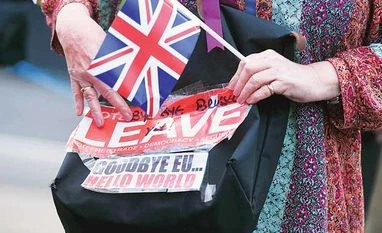Nearly 2.3 million people in the UK regret voting for Brexit from the EU in last week's historic referendum, a trend which has come to be referred to as "Bregret", a new survey said today.
According to the "Opinium survey", seven per cent of the people who voted to leave the European Union (EU) now regretted their choice and may vote for remain instead if they had a choice.
When the survey's findings are projected on to the statistics of the June 23 referendum, it cuts the Leave vote-share by 2.3 million, wiping out its majority and reversing the shock result in favour of Brexit, the survey said.
"Remain voters want the government to prioritise staying part of the EU's single market while Leave voters are keen to end free movement between the UK and the EU and both priorities are likely to be mutually exclusive," he said.
The survey also found that 3 per cent of those who voted Remain also regretted their choice.
More than half of those surveyed felt both the UK's economy and position in the world had worsened following the referendum, but almost one in 10 said they did not believe the Brexit would be implemented.
More than 4 million people have now signed a petition calling for a second EU referendum but the government has ruled out another vote on the issue to avoid what outgoing British Prime Minister David Cameron had termed as "neverendum".
The majority of those questioned also wanted a general election to be held before official negotiations on the Brexit begins, with Theresa May the favoured candidate to take Caomeron's place as Prime Minister among Conservatives and Jeremy Corbyn among Labour.
Opinion polls in the months leading up to last week's historic vote had dominantly shown a lead for Remain, although surveys in recent days showed the result on a knife-edge and around 10 per cent of the electorate still undecided - generating a huge swing.
The final result was 17,410,742 votes for Leave (51.9 per cent) compared to 16,141,241 for Remain (48.1 per cent), on a turnout of 72 per cent.
According to the "Opinium survey", seven per cent of the people who voted to leave the European Union (EU) now regretted their choice and may vote for remain instead if they had a choice.
When the survey's findings are projected on to the statistics of the June 23 referendum, it cuts the Leave vote-share by 2.3 million, wiping out its majority and reversing the shock result in favour of Brexit, the survey said.
Also Read
"The UK is just as divided post-referendum as it was pre-referendum with voters split on what the UK's relationship with the EU should be after we leave and what the priority should be in the ensuing negotiations," Adam Drummond from Opinium Research told 'The Independent'.
"Remain voters want the government to prioritise staying part of the EU's single market while Leave voters are keen to end free movement between the UK and the EU and both priorities are likely to be mutually exclusive," he said.
The survey also found that 3 per cent of those who voted Remain also regretted their choice.
More than half of those surveyed felt both the UK's economy and position in the world had worsened following the referendum, but almost one in 10 said they did not believe the Brexit would be implemented.
More than 4 million people have now signed a petition calling for a second EU referendum but the government has ruled out another vote on the issue to avoid what outgoing British Prime Minister David Cameron had termed as "neverendum".
The majority of those questioned also wanted a general election to be held before official negotiations on the Brexit begins, with Theresa May the favoured candidate to take Caomeron's place as Prime Minister among Conservatives and Jeremy Corbyn among Labour.
Opinion polls in the months leading up to last week's historic vote had dominantly shown a lead for Remain, although surveys in recent days showed the result on a knife-edge and around 10 per cent of the electorate still undecided - generating a huge swing.
The final result was 17,410,742 votes for Leave (51.9 per cent) compared to 16,141,241 for Remain (48.1 per cent), on a turnout of 72 per cent.
)